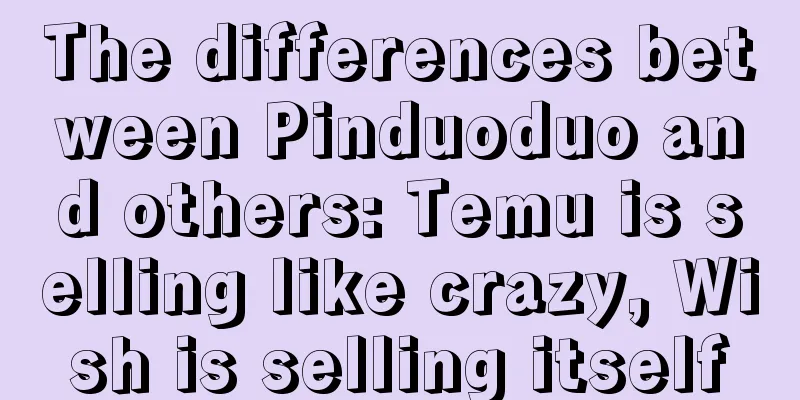Under the pressure of continued high inflation in the past two years, the trend of consumption downgrade in Europe and the United States has become more and more serious. More and more consumers prefer cost-effective products, which has also brought more imaginative development opportunities to many low-price e-commerce platforms. Temu is one of the brightest new stars among them.
However, although price is the primary driving force that influences consumer decisions, the low-price model also hides many development disadvantages. When the platform grows to a certain size, it will inevitably fall into the siege of low-price competition. Today, on this track, the young Temu is still accelerating, but Wish, which entered the market early, was eliminated early because it failed to overcome the hurdle of the low-price model.
On February 11th local time, the annual "American Spring Festival Gala" Super Bowl Held in Las Vegas, a familiar figure appeared in front of Americans again at this top-tier American traffic feast - Temu landed in the Super Bowl for two consecutive years. In its debut at the Super Bowl last year, Temu successfully gained popularity with its brainwashing slogan “Shop like a billionaire”, which led to a simultaneous surge in traffic and downloads, and also laid a solid foundation for its surge in the global market last year. Having tasted the sweetness, Temu naturally would not miss this excellent publicity opportunity. A week before the competition, Temu started to warm up early, launching a 90% discount event and providing gifts worth 10 million US dollars. Before and during this year's Super Bowl, Temu was even more "extravagant", running a total of six brainwashing ads. Media analysis said that the advertising price of this year's Super Bowl was higher than last year, so Temu's advertising investment may be as high as tens of millions of dollars. Just one 30-second ad spot on Sunday night cost about 7 million US dollars. With huge investment, the traffic effect of the Super Bowl was immediate: research data from mobile intelligence company Apptopia showed that Temu's downloads surged after the ad was played, increasing by 34% on Super Bowl day compared to the previous day, which was its fastest daily growth record since November. Although Temu's advertisement was rated as the "worst advertisement" by foreign media, lacking highlights and creativity, it was still a magical brainwashing advertisement. The six-continuing advertisement rotation successfully triggered a wave of online discussions. As more and more Americans became aware of this Chinese low-cost platform, its recognition was also gradually increasing. It is estimated that Temu's marketing expenses in the past year were about 2.1 billion US dollars. It can be said that the reason why it was able to gain momentum in just one year is inseparable from the intensive marketing. Although its scale is not yet comparable to giants such as Amazon, it continues to lead in attracting new users. Sensor Tower Data shows that as of January this year, Temu's monthly active users in the United States have exceeded 50 million, a year-on-year increase of 300%. Temu, which has been online for just over a year, has successfully risen to the top with its extreme cost-effectiveness and viral marketing, and has become a leader in low-cost e-commerce platforms. But what is quite dramatic is that, as representatives of low-price platforms, Temu has made a splash at the Super Bowl for two consecutive years, while Wish announced its sale the day after the Super Bowl.
On February 12, local time, Wish’s parent company ContextLogic Announced that the Board of Directors has agreed to sell the majority of its operating assets and liabilities to Qoo10 for approximately US$173 million. The transaction was priced at $6.50 per share in cash. It is reported that the transaction was carried out after a strategic review initiated under pressure from Cannell Capital and other activist investors. Wish's continued losses and declining market value have caused investors to be worried. After the transaction is completed, Wish will retain its listing status and retain the Wish brand and platform. If approved by shareholders, the transaction is expected to be completed in the second quarter of 2024. Founded in 2010, Wish has always been famous for its low prices and a wide variety of products, and is dubbed the "American version of Pinduoduo" in the industry. Once upon a time, low-price sales and social gameplay became Wish's magic weapon to leverage the overseas sinking market, and it once became the world's most downloaded shopping app, and took advantage of the opportunity to knock on the door of IPO. However, the "traffic" accumulated by the low-price model is ultimately false. Under the impact of problems such as product quality and merchant management, Wish's situation took a sharp turn for the worse after its successful listing. On the one hand, huge marketing costs dragged down profits, and on the other hand, the low-price model led to a decline in reputation and rampant vicious competition. Wish, which lacked internal brand driving force, was gradually abandoned by consumers and merchants and fell into an embarrassing situation of losses for seven consecutive years. Data shows that the number of its active users dropped from 90 million in 2021 to 27 million in 2022. According to the latest financial report data released by Wish, its revenue in 2023 was US$60 million, a year-on-year decrease of 52%, and its net loss was US$80 million. Although it has narrowed, there is still a long way to go before profitability. For this reason, Wish has tried to save itself several times, by improving user experience, strengthening brand upgrades, reducing costs and increasing efficiency, in an attempt to regain market share. However, with the emergence of the "genuine Pinduoduo" disrupting the competitive landscape, WIsh's living space has been further squeezed. As low-price platforms, Temu and Wish have similar business models and development trajectories: bringing China's cost-effective products to the sinking markets in Europe and the United States, having a huge mobile traffic entrance, and relying on money-burning marketing to quickly attract traffic in the early stages. But the difference is that Temu implements a fully managed model, which achieves maximum cost control through a highly centralized sales process. In fact, the reason why WIsh declined was largely due to its eagerness to expand and the relaxation of merchant entry requirements, which led to a decline in the reputation of the platform's product quality, the lack of supervision by merchants and chaos, which in turn caused a large number of user losses. In contrast, Temu has absolute control over pricing and merchants, and can better control product quality to improve the platform's service capabilities. Temu, which has attracted Wish's previous experience, is currently also committed to optimizing user experience and implementing a series of policies to enhance its brand image and get rid of the label of low price = low quality. As low-price platforms, the two platforms are now experiencing divergent fates. Wish failed to reverse its reputation due to its low prices, but Temu, which is still thriving, cannot rest on its laurels.
|










